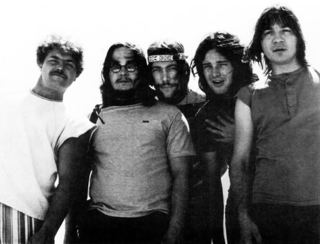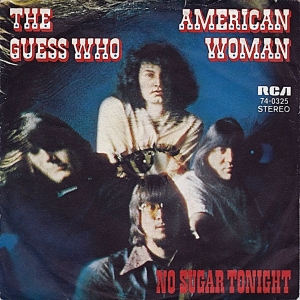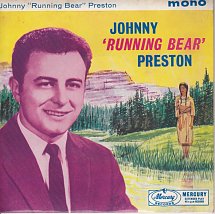
The Guess Who are a Canadian rock band from Winnipeg, Manitoba, best known for their blues rock and psychedelic rock hits from 1968 to 1975.

American Woman is the sixth studio album by Canadian rock band The Guess Who, and was released in January 1970. It was the last to feature lead guitarist Randy Bachman until a reformation effort in 1983. The album was one of their most successful releases, receiving Gold certification in the United States.

"South Side" is a song written and recorded by American electronica musician Moby. It was released to radio on October 10, 2000, as the seventh single from his fifth studio album, Play. Initially recorded with No Doubt frontwoman Gwen Stefani, production problems forced Moby to leave Stefani's vocals off the mix of the song included on Play; Stefani's vocals were then restored for the song's single release. The drums are sampled from "What's Up Front That Counts" by the Counts.

"Tears in Heaven" is a song by Eric Clapton and Will Jennings, written about the death of Clapton's four-year-old son, Conor. It appeared on the 1991 Rush film soundtrack. In January 1992, Clapton performed the song in front of an audience at Bray Studios, Berkshire, England for MTV Unplugged, with the recording appearing on his Unplugged album.

"Smooth" is a collaboration between Latin rock band Santana and Matchbox Twenty vocalist Rob Thomas. The song was written by Itaal Shur and Thomas, produced by Matt Serletic, and sung by Thomas. In the United States, it topped the Billboard Hot 100 for 12 weeks; it was the final number-one hit of the 1990s and the first number-one hit of the 2000s. "Smooth" is the only song to appear on two decade-end Billboard charts. In 2018 "Smooth" was ranked the second most successful song ever in Billboard's 60th anniversary all-time top 100 songs. It won three Grammy Awards: Record of the Year, Song of the Year, and Best Pop Collaboration with Vocals. The song reached number one in Canada and the top 10 in Australia, Austria, Ireland and the United Kingdom.

"American Woman" is a song released by the Canadian rock band the Guess Who in January 1970, from their sixth studio album of the same name. It was later released in March 1970 as a single backed with "No Sugar Tonight", and it reached number one for three weeks commencing May 9 on both the United States' Billboard Hot 100 and the Canadian RPM magazine singles chart. Billboard magazine placed the single at number three on the Year-End Hot 100 singles of 1970 list, and it was listed as number five for 1970 on the RPM Year-End Chart. On May 22, 1970, the single was certified as gold by the RIAA. It also reached the top ten in the Netherlands, Switzerland and Austria, and the top twenty in the United Kingdom and New Zealand.

"Rockin' Robin" is a song written by Leon René under the pseudonym Jimmie Thomas, and recorded by Bobby Day in 1958. It was Day's biggest hit single, becoming a number two hit on the Billboard Hot 100, and spent one week at the top of the charts in R&B sales. Michael Jackson recorded his own version of the song in 1972, which achieved greater success.

"Running Bear" is a teenage tragedy song written by Jiles Perry Richardson and sung most famously by Johnny Preston in 1959. The 1959 recording featured background vocals by Richardson, George Jones, and the session's producer Bill Hall, who provided the "Indian chanting" of "uga-uga" during the three verses, as well as the "Indian war cries" at the start and end of the record. It was No. 1 for three weeks in January 1960 on the Billboard Hot 100 in the United States. The song also reached No. 1 in the UK Singles Chart and New Zealand in 1960. Coincidentally, "Running Bear" was immediately preceded in the Hot 100 No. 1 position by Marty Robbins' "El Paso", another song in which the protagonist dies. Billboard ranked "Running Bear" as the No. 4 song of 1960.

"Block Rockin' Beats" is a song by British big beat duo the Chemical Brothers. Released as the second single from their second studio album, Dig Your Own Hole (1997), in March 1997, it topped the UK Singles Chart and peaked at number 40 on the US Billboard Modern Rock Tracks chart. It received a Grammy Award for Best Rock Instrumental Performance.

"Rockin' Around the Christmas Tree" is a Christmas song written by Johnny Marks and recorded by Brenda Lee in 1958; it has since been recorded by numerous other music artists. By the song's 50th anniversary in 2008, Lee's original version had sold over 25 million copies with the 4th most digital downloads sold of any Christmas single.

The discography of Nickelback, a Canadian rock band, consists of nine studio albums, two compilation albums, one extended play (EP), 44 singles, five video albums and 32 music videos. Formed in Hanna, Alberta in 1995 by Chad Kroeger, Ryan Peake, Mike Kroeger and Brandon Kroeger, the band issued its debut album Curb in 1996 through non-profit organization FACTOR, followed by a self-released follow-up The State in 1998. That year, Ryan Vikedal took over on drums after a brief tenure for Mitch Guindon. In late 1999 the group signed with Roadrunner Records, who issued The State internationally early the next year. The album reached number 130 on the US Billboard 200. Four singles were issued from The State, with the first three all registering on the US Billboard Mainstream Rock chart.

Rockin' is the ninth studio album by the Canadian rock band The Guess Who. It was originally released by RCA Records in 1972. It is the last album by the group to feature rhythm guitarist Greg Leskiw.

Flavours is the thirteenth studio album by the Canadian rock band The Guess Who. This was the first album by the group to feature Domenic Troiano on guitar.

"Star Baby" is a 1974 hit song by The Guess Who. It was written by Burton Cummings who also provided the lead vocals. It is classified in the genre of Power pop and was included on the group's LP entitled, Road Food as well as The Guess Who – Greatest Hits in 1999 and The Guess Who - Anthology in 2003. The band performed the song on the Midnight Special television program on December 14, 1973.

"Runnin' Back to Saskatoon" is a song written by Burton Cummings and Kurt Winter.

"Guns, Guns, Guns" is a popular rock and roll song written by Burton Cummings recorded by the Canadian rock group The Guess Who for the album Rockin'. It is also included on their 1974 compilation album The Best of the Guess Who, Vol. 2.

Live at the Paramount is a live album released by Canadian rock group The Guess Who in 1972. It was recorded on May 22, 1972 at the Paramount Theatre in Seattle, Washington. Live at the Paramount was the first Guess Who album to feature Donnie McDougall on rhythm guitar and the last to feature original bassist Jim Kale. It also includes performances of 3 exclusive songs not included on any of their studio albums: "Glace Bay Blues," "Runnin' Back to Saskatoon," and "Truckin' Off Across the Sky."

"Undun" is a popular song by Canadian rock band The Guess Who. It spent two weeks at #21 on the Canadian Singles Chart in November–December 1969 and reached #15 on the U.S. adult contemporary chart and #22 on the Billboard Hot 100.
"Hey Ho, What You Do to Me" is a song written by Nickolas Ashford, Valerie Simpson, and Jo Armstead and performed by Chad Allan and the Expressions. It reached #3 in Canada in 1965. The song was released in the United States in August of that same year and reached #125 on the Billboard chart. It was featured on their 1965 album, Hey Ho

"Albert Flasher" is a song written by Burton Cummings and performed by Canadian rock band The Guess Who. Initially released as the B-side of their "Broken" single in 1971, it was promoted to A-side status in mid-May of that year, according to the Billboard Hot 100 chart. It did not appear on any of their studio albums at that time, although it would much later be included on reissues of the band's 1971 album So Long, Bannatyne. It would also appear on many of their later compilation albums, including the 1973 release The Best of The Guess Who Volume II and the 1973 compilation EP titled The Guess Who. It was also performed many times in concert, including the performance captured on Live at the Paramount (1972).


















